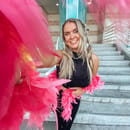In the blink of an eye, this year’s spooky season is behind us! After the annual Halloween festivities, I usually like to take the time to reflect on the trends, the activities, and, most of all, the costumes. While I enjoyed this Halloween, and I’m sure many of you had really cute costumes on, I still couldn’t believe my eyes when I saw some people walking down the street in costumes that I thought we, as a society, had deemed insensitive a long time ago. So many costumes that attacked other cultures, genders, races, sexualities and more. While in disbelief, I couldn’t help but ask myself: “What happened? Are we allowing this again? I thought we moved past this but was I wrong?”
With that, let’s discuss the dont’s of costumes so we can better ourselves, become more knowledgeable about this together, and begin planning next year’s costumes!
Transphobic costumes
If your costume makes fun of a marginalized group of people, it probably shouldn’t be on your list of potential Halloween costumes. It’s in bad taste, and if you’re thinking to yourself, “People are gonna find this hilarious,” let me save you some embarrassment…. it’s not funny. In 2016 Huffpost published an article covering a costume on Walmart shelves titled “Tranny Granny,” and after consumers pointed out that this not only mocks transgender women but also uses a transphobic slur right on the title of the costume, it was pulled from the superstore’s product list. Trans people are not a costume, and overall, these costumes are in bad taste.
Racial stereotypes
Dressing up as “anything involving blackface” is a hard no. Never in any circumstance is it acceptable to tint your natural skin tone in order to have a laugh. We need to keep in mind that dressing up in outfits that reinforce racist stereotypes only continues the oppression of others. Let me give you an example. If you identify as a white person, avoid stereotyping cultures that aren’t yours, even if you intend to pay homage to a specific person. Just because Julianne Hough’s favorite “Orange Is the New Black” character is Uzo Aduba’s role as Crazy Eyes, does not mean she can dress as her for Halloween.
Mental illness
Halloween costumes are often utilized to make light of difficult topics. We often neglect the idea that some aspects of a person are beneath the surface and are not always visible to the eye. Mental health is a very serious topic for many and often in media representation can be seen as “crazy.” Depicting mentally ill individuals by wearing straight jackets, hospital gowns or any other equipment typically associated with institutionalized people creates a negative stigma around the conversation of mental health.
Sexual harassment
We all have seen through movements such as #MeToo that sexual harassment has never been a topic of comedy. Nonconsensual sexual acts bring forth more trauma than laughter. These kinds of costumes are not only offensive but may also trigger those who have dealt with harassment themselves.
This list merely scratches the surface of some of the costumes I saw this year. This list is not limited to these four topics. We as a society are constantly changing and adapting to respect each other and should continue to learn about our differences in order to honor the diversity we share. Next year, let’s really think about our costumes and ensure that we have fun as long as it’s not a the expense of each other’s identities.


